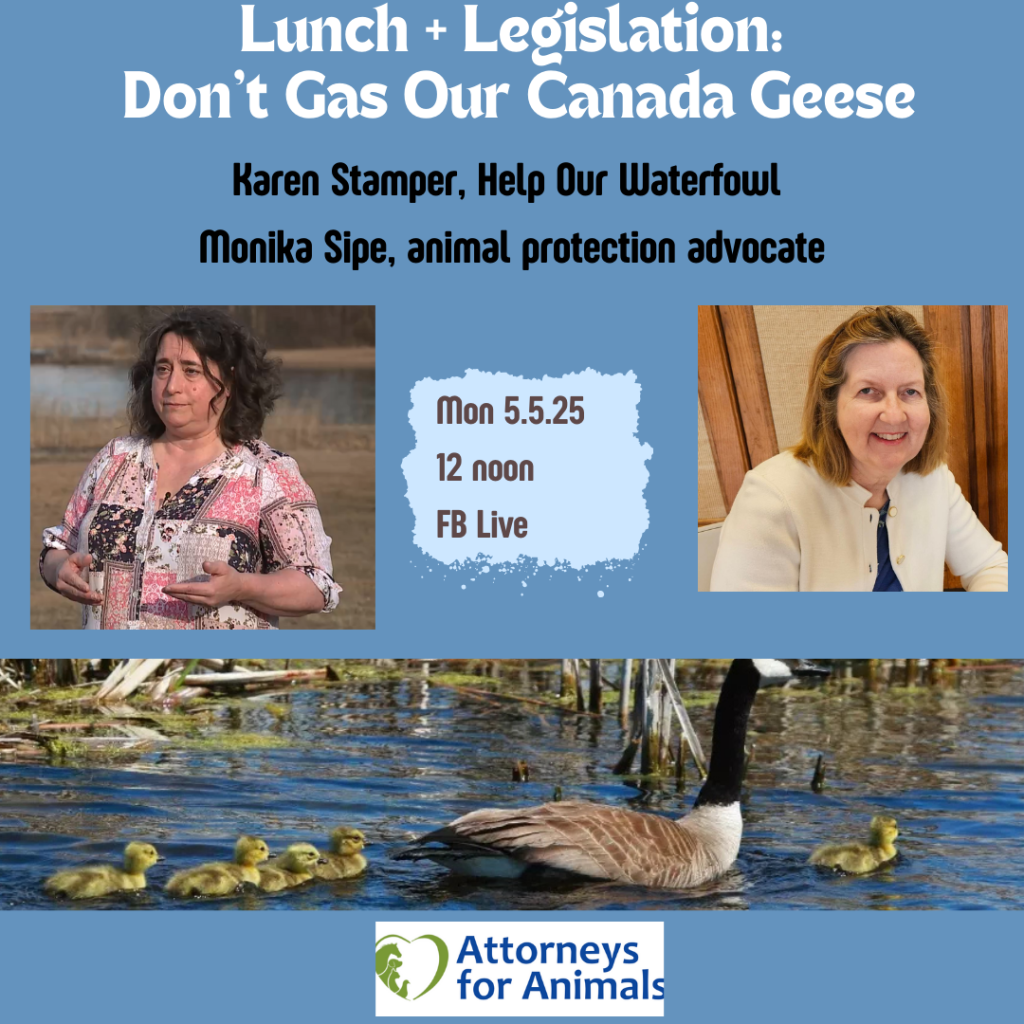This month’s Lunch + Legislation touches on a timely topic: because of an Order proposed by Michigan’s Department of Natural Resources and approved by its Natural Resources Commission in October 2024, Canada Geese and their young will no longer be relocated, nor will other non-lethal methods be prioritized. This opens the door for more lethal control, in this case gassing them with CO2 delivered in mobile units by the USDA’s Wildlife Services.
Karen and Monika have spearheaded a campaign to get the gassing stopped. From starting a petition, to partnering with the national organization, In Defense of Animals, to convening a group of Michigan-based organizations and individuals, to delving into the science (spoiler alert: there’s sound science that basically says the Canada Geese are being blamed for environmental problems that are largely caused by human activities) to constant dialogue with DNR staff and using FOIA requests confirming that that the program is not transparent nor supervised properly nor is information submitted by permit applicants validated, to working with elected officials to spread the word, to installing billboards in prominent locations intended for legislators’ eyes as they travel to Lansing.
For example, Karen FOIA’d the identities of who applied for the permit (usually golf courses, HOAs of waterfront properties, parks, and businesses). When one county park learned what the bureaucratic form they filled out really meant — and that there was a change in official policy — they were disturbed.
Karen and Monika carefully laid out, and then refuted, two points used by state officials to justify the policy change: that it’s to combat HPAI (bird flu), and that gassing the geese is a form of “euthanasia” (good death) that comes within guidelines set by the American Veterinary Medical Association.
Karen made short shrift of the DNR’s argument that relocation would spread bird flu, noting that during a roundup last summer, the workers wore no protective gear, there are plans to put the dead birds’ bodies in landfill or donate to a food bank, and that the DNR is not concerned about other bird species spreading HPAI (e.g., they haven’t regulated the farm-raised pheasant release to allow hunting of these birds):
“The [DNR] waterfowl specialist told me it was all about the bird flu. [In the past] they would round them up and take them to state game areas … but now they can’t do that because a bird might have the disease and carry it to other locations. But you know it doesn’t really make sense because all birds fly.” Karen Stamper, Lunch + Legislation, May 5, 2025
It all comes down to how you view other animals and whether you believe that humans should co-exist with other species, even if it requires some modification of behavior. Monika put it this way:
“It’s so tragic when they do these roundups … the baby geese are just getting their flight feathers. Their parents are growing in their flight feathers. If [people] would just have patience to wait for a couple of weeks, the geese would fly away because they’ve been cooped up. … They want to teach their young how to fly and soar. Some will migrate and some will go pond hopping. It’s just so tragic that they’re not going to have that chance.” Monika Sipe, Lunch + Legislation, May 5, 2025

